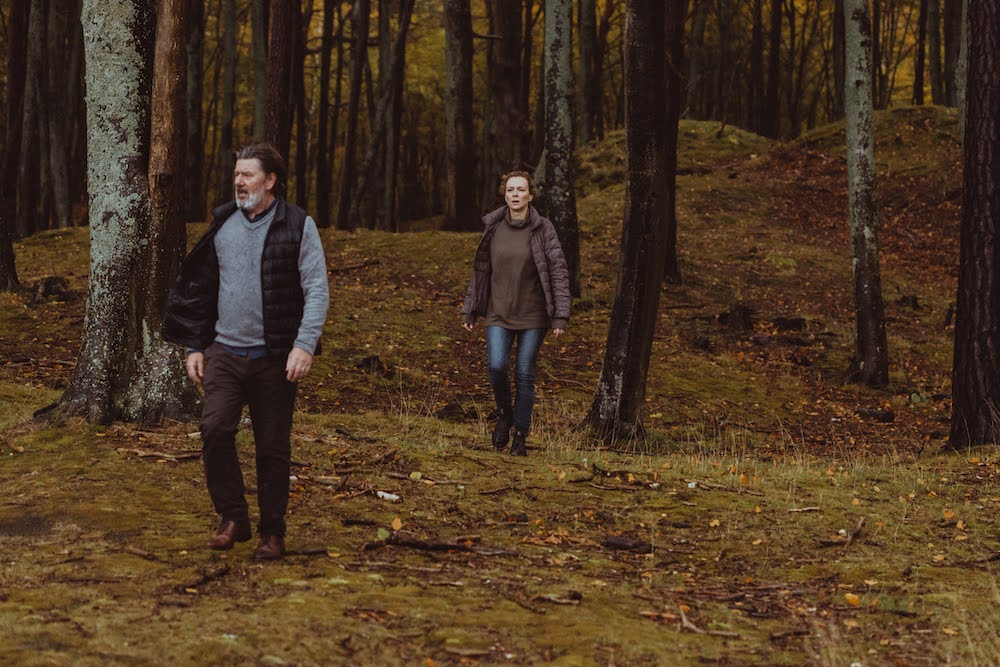“When have you ever gone off alone?” scoffs Magnus (Thomas W Gabrielsson) when his wife, Maria (Mirja Turestedt), expresses the wish to go to England rather than Morocco for their joint sabbatical. Famous last words.
Caroline Ingvarsson’s debut feature, adapted from Swedish writer Håkan Nesser’s complex psychological thriller The Living and the Dead in Winsford, is big on atmosphere but leaves too much to the imagination, skimming over the surface of the book, which is well worth reading, and extracting only bare, unsustaining bones.
Something bad goes down in a bunker, but it’s hard to tell precisely what, which is frustrating. However, Turestedt’s performance is excellent, and the landscape is beautiful: it’s shot mainly on an autumnal Exmoor and also on the Baltic coast in Poland, where the disused bunker features. And there’s a charming dog called Castor.
Maria is a successful Stockholm TV presenter, unafraid of speaking out about domestic abuse, while Magnus, who’s unpleasant and louche, is a well known academic writer and professor (both pictured below). They’ve been married for 27 years. He’s been accused of rape, but maintains his innocence, unconvincingly. The girl couldn’t resist him, he tells her. You think just because she’s a woman she can’t lie? But Maria has spoken to the girl in question (Anna Prochniak), who says that Magnus drugged her, that she woke up with his sperm on her stomach and that he told her the next morning that it couldn’t be called rape because she couldn’t remember it. Rather incredibly, Maria seems incapable of standing up to Magnus and clings to the idea of his innocence. Perhaps anything else would be too disruptive to their careers, and there’s a pervasive feeling of ambiguous motives and self-deception.
But Maria has spoken to the girl in question (Anna Prochniak), who says that Magnus drugged her, that she woke up with his sperm on her stomach and that he told her the next morning that it couldn’t be called rape because she couldn’t remember it. Rather incredibly, Maria seems incapable of standing up to Magnus and clings to the idea of his innocence. Perhaps anything else would be too disruptive to their careers, and there’s a pervasive feeling of ambiguous motives and self-deception.
So, tired of being hassled by reporters, off they drive together with Castor, visiting an old friend in Poland on the way to Morocco, where Magnus will write a literary memoir and Maria will plan her new TV show. In Poland, Magnus, his old poet friend Soblewski and his glamorous, much younger girlfriend Barbara get drunk and dance while Maria looks on, sober and fuming. She smashes a glass ornament and seems on the verge of an explosion.
After the confusing incident in the bunker on the beach the next day, Maria is on her own, driving frantically along the motorways of Europe with Castor in the back. How does she get him into England from France, one wonders (we know it’s England because she’s driving on the left). She ends up rather suddenly in a primitive old cottage on Exmoor that she’s managed to rent en route, though, mystifyingly, no one is there to let her in or show her round.
She and Castor take walks through the vast, gorgeous landscape of heather, gorse and bracken, meeting some wild ponies along the way, and spend time in the pub, where Maria turns on her laptop and looks worriedly at emails from Bergman, Magnus’s publisher (Sven Ahlström; Wallander). Get him to call me at once, he writes, as the British translators are getting antsy.
 Maria bites her lip and starts editing Magnus’s manuscript, something that she’s clearly an old hand at (in a flashback he’s grumpy about her deleting a reference to Kierkegaard in his essay on hermeneutics. It was extraneous, she says crisply). There’s also a message saying, “I’ve found you,” and a white car that seems to be following her, but are these merely manifestations of Maria’s guilt? We never know.
Maria bites her lip and starts editing Magnus’s manuscript, something that she’s clearly an old hand at (in a flashback he’s grumpy about her deleting a reference to Kierkegaard in his essay on hermeneutics. It was extraneous, she says crisply). There’s also a message saying, “I’ve found you,” and a white car that seems to be following her, but are these merely manifestations of Maria’s guilt? We never know.
A love interest appears in the form of widower Mark (Kris Hitchen; Sorry We Missed You), whose teenage son, Jeremy, obsessively makes boxes for barn owls. Mark realises something’s amiss with Maria, but she fobs him off with vague words about her problematic ex-marriage to a kind of genius. Even so, their relationship looks promising. She’s obviously haunted, but manages to keep a lid on it and maintain a mask of normality. And of course, keeping up appearances is part of her job as a presenter.
“A crack is a fine line. You never know when you’ve crossed it,” Bergman tells Maria when she returns to Stockholm, where the police are about to catch up with her, though these are supposed to be comforting words about grief. Maria has indeed crossed a line, but in the end you don’t feel you know enough about how or why, or in fact whether she’d be capable of such a crime.














Add comment